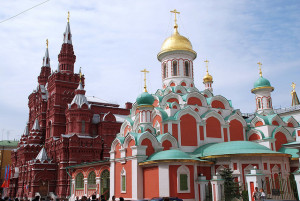As international trepidation intensifies over the trajectory of Russian politics, hand in hand with Western fears of Putin’s tightening grip on the country comes the fact of recession. The Russian economy has been seriously weathered by economic sanctions placed on it after invading Ukraine as well as the global fall in the value of crude oil. Despite this, a recent press release published by Frost & Sullivan on the state of Russian ecommerce growth characterizes it as “dynamic”, with recent annual growth rates at 20-30%.
Why is Russian ecommerce outperforming the national economy?
The growth of ecommerce in Russia is largely due to the fact that ecommerce adoption in the massive country has been generally slow. The domestic online retail market amounted to less than $20 billion in 2014 for physical goods and services (putting aside cross-border flows), but is projected to grow to $100 billion in value in 10 years.
From the E-Commerce in Russia digital whitepaper published by East-West digital news:
In the fall of 2014, 62% of the adult population, or 72.3 million people, were connected on a monthly basis, according to the Public Opinion Foundation (FOM). Of them, 59.9 million people used the Internet daily. The Internet became popular in Russia much later than in advanced European countries, with a mere 10% of the adult population connected in 2003 and just 20% in 2007.
As ecommerce continues to develop in Russia, growth will come as the practice spreads further beyond cosmopolitan centers of commerce and across the vast amount of populated territory that makes up the country.
Opportunity may be hampered by the potential difficulties surrounding foreign investment in Russia.
The problem of logistics in Russia has historically been a major one, given the size of the country and the relative underdevelopment of infrastructure throughout a large part of the nation. In 2015, however, much headway has bee made in meeting these logistical challenges, and Russian cross-border sales have gone up to $5 billion in 2014, up 75% from the previous year. While this growth is rapidly continuing, Chinese online retailers seem to be capturing the entirety, with a current stagnation of sales volume from the West, giving rise to fears that the West is losing out in Russian markets.
In order for ecommerce brands to get around this challenge, they will need strategic investment, which may be hampered by the tenuous nature of Russia’s role in global politics. It remains to be seen whether foreign pioneers such as Ebay, an early entry into the Russian ecommerce landscape, will be able to create the means to take advantage of current growth. Both the costs and rewards of their efforts have the potential to be great.
East-West Digital News are valued partners of etail Europe – learn more about the event here
Photo Credit: Andrey





Recent Comments